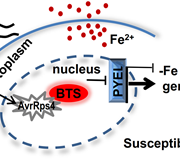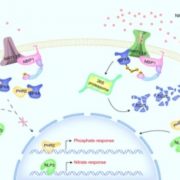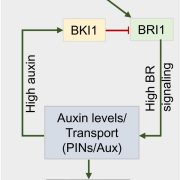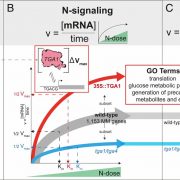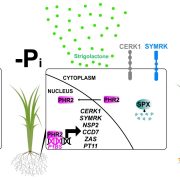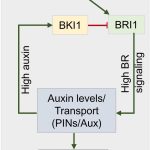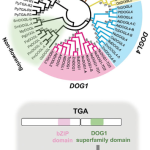PDX1.1-dependent vitamin B6 synthesis alleviates ammonium toxicity-associated ROS production (Mol Plant)
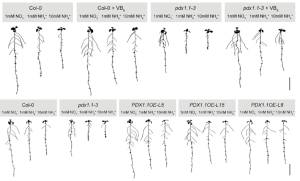 Ammonium is a nitrogen form preferred by many plant species. However, high ammonium concentrations lead to decreased primary root elongation due to membrane depolarization and lower apoplastic pH. Liu et al. report that ammonium toxicity results in iron-dependent reactive oxygen species (ROS) production and thereby decreases primary root elongation. Based on ammonium responsive transcriptome data, T-DNA mutants of 29 ammonium responsive genes were evaluated, and the T-DNA mutant of PDX1.1, a gene associated with biosynthesis of vitamin B6, was found to be hypersensitive to ammonium toxicity. Expression of PDX1.1 was upregulated by hydrogen peroxide generated by high ammonium and low pH conditions. Like other vitamins, vitamin B6 is a collection of related structures called vitamers. PDX1.1 overexpressing lines showed higher accumulation of non-phosphorylated B6 vitamers and improved the tolerance to ammonium toxicity, as well as tolerance to phosphorus deficiency and nickel toxicity. PDX1.1 is a good candidate gene for improving plant’s tolerance to growth inhibition associated with crop cultivation in ammonium rich agriculture lands. (Summary by Lekshmy Sathee @lekshmysnair) Mol. Plant 10.1016/j.molp.2022.01.012
Ammonium is a nitrogen form preferred by many plant species. However, high ammonium concentrations lead to decreased primary root elongation due to membrane depolarization and lower apoplastic pH. Liu et al. report that ammonium toxicity results in iron-dependent reactive oxygen species (ROS) production and thereby decreases primary root elongation. Based on ammonium responsive transcriptome data, T-DNA mutants of 29 ammonium responsive genes were evaluated, and the T-DNA mutant of PDX1.1, a gene associated with biosynthesis of vitamin B6, was found to be hypersensitive to ammonium toxicity. Expression of PDX1.1 was upregulated by hydrogen peroxide generated by high ammonium and low pH conditions. Like other vitamins, vitamin B6 is a collection of related structures called vitamers. PDX1.1 overexpressing lines showed higher accumulation of non-phosphorylated B6 vitamers and improved the tolerance to ammonium toxicity, as well as tolerance to phosphorus deficiency and nickel toxicity. PDX1.1 is a good candidate gene for improving plant’s tolerance to growth inhibition associated with crop cultivation in ammonium rich agriculture lands. (Summary by Lekshmy Sathee @lekshmysnair) Mol. Plant 10.1016/j.molp.2022.01.012


